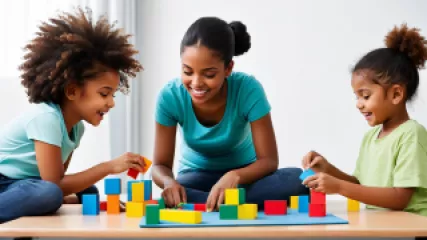Effective Strategies for Building Childhood Resilience
Introduction
Childhood resilience is the ability of a child to adapt and bounce back from adversity, trauma, or stress. It plays a crucial role in a child's overall development and well-being. Resilient children are better equipped to handle challenges, build positive relationships, and thrive in various aspects of life. As caregivers, parents, or educators, we have a significant role to play in fostering resilience in children.
Understanding Childhood Resilience
Resilience is not an innate trait; it can be developed and strengthened over time. It is important to understand the factors that contribute to building resilience in children:
- Supportive Relationships: Positive and nurturing relationships with parents, caregivers, teachers, and peers provide a strong foundation for building resilience.
- Positive Self-Image: Developing a sense of self-worth and confidence helps children believe in their abilities to face and overcome challenges.
- Problem-Solving Skills: Teaching children effective problem-solving skills equips them with the ability to find solutions and navigate through difficult situations.
- Emotional Regulation: Helping children recognize and manage their emotions in a healthy way promotes resilience and prevents emotional distress.
- Optimism and Positive Thinking: Encouraging a positive outlook and focusing on strengths and possibilities can enhance a child's resilience.
Effective Strategies for Building Childhood Resilience
1. Foster Secure Attachment
A secure attachment bond between a child and their caregiver provides a safe and supportive environment for the child to explore and develop resilience. Responding sensitively to a child's needs, providing comfort, and establishing trust are key in building this attachment. Spending quality time together, engaging in activities, and showing affection are ways to nurture a secure attachment.
2. Encourage Healthy Risk-Taking
Allowing children to engage in age-appropriate risks and challenges helps them develop resilience. Encourage them to try new activities, face manageable obstacles, and learn from their mistakes. This fosters a growth mindset, where they understand that failures and setbacks are opportunities for learning and growth.
3. Teach Problem-Solving Skills
Empower children by teaching them problem-solving skills. Encourage them to identify the problem, brainstorm possible solutions, evaluate the pros and cons, and select the best course of action. Guiding them through this process helps build their confidence in handling difficult situations independently.
4. Develop Emotional Intelligence
Emotional intelligence plays a vital role in resilience. Help children identify and express their emotions effectively. Teach them coping strategies such as deep breathing, journaling, or talking to a trusted adult when they feel overwhelmed. By understanding and managing their emotions, children can navigate challenges more successfully.
5. Cultivate a Growth Mindset
A growth mindset is the belief that abilities and intelligence can be developed through effort and practice. Encourage children to view failures and setbacks as opportunities for learning and growth. Praise their efforts and perseverance rather than focusing solely on outcomes. This mindset promotes resilience and a willingness to take on challenges.
6. Foster Social Connections
Strong social connections are essential for building resilience. Encourage children to participate in group activities, join clubs or sports teams, and develop friendships. These connections provide emotional support, a sense of belonging, and opportunities for collaboration, which contribute to resilience.
7. Provide a Safe and Structured Environment
A safe and structured environment helps children feel secure and develop resilience. Establish consistent routines, clear expectations, and appropriate boundaries. Create a nurturing space that allows children to explore, learn, and grow while feeling protected and supported.
8. Promote Self-Care
Teach children the importance of self-care and self-compassion. Encourage activities such as physical exercise, mindfulness, hobbies, and spending time in nature. Engaging in self-care practices helps children recharge, reduce stress, and build resilience.
9. Model Resilience
As adults, we play a significant role in modeling resilience for children. Demonstrate healthy coping strategies, positive problem-solving skills, and optimism in the face of adversity. By modeling resilience, we inspire and teach children valuable skills they can apply in their own lives.
Conclusion
Building childhood resilience is a lifelong process that requires nurturing and support from caregivers, parents, and educators. By understanding the factors that contribute to resilience and implementing effective strategies, we can empower children to navigate challenges, develop a positive outlook, and thrive in all aspects of life. Remember, resilient children become resilient adults, capable of facing whatever life throws their way.






